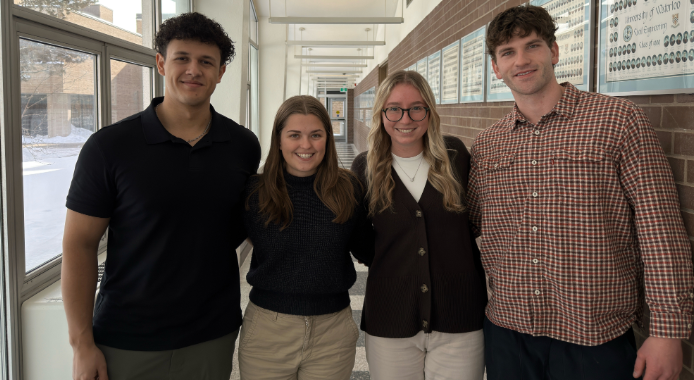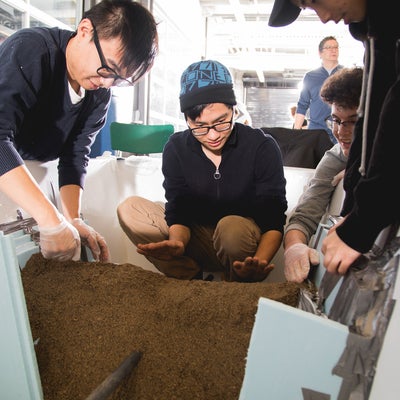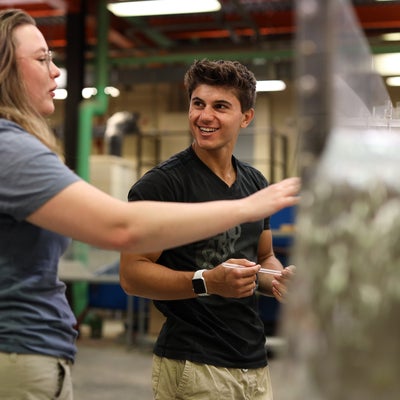Why Civil Engineering?
Civil engineers design and maintain the massive infrastructure which today's society depends upon: roads, buildings, bridges, dams, tunnels, levees, sewer systems, and water treatment plants. Because civil engineers' primary client is society, we often must deal with the human impact of engineering, including social, moral and legal issues.
Our Civil Engineering program is designed to produce skilled engineers capable of designing, constructing and maintaining the infrastructure that shapes our world. This program offers a blend of theoretical knowledge and practical experience, preparing students to tackle the complexities of modern civil engineering projects. You'll learn essential topics such as structural engineering, transportation engineering, geotechnical engineering, environmental engineering and water resources. This ensures a broad and deep understanding of civil engineering principles. Graduates are well-prepared for careers in various sectors, including construction, infrastructure development, environmental consulting and urban planning.
Courses in Civil Engineering
You’ll take a mix of foundational engineering and mathematics courses in first year. After first year, most of your classes will be Civil Engineering courses covering topics such as geotechnical engineering, structural analysis, project management, hydrology and transportation.
Sample first-year courses
This is a sample schedule. Courses are subject to change.
| Fall Term (September to December) | Winter Term (January to April) |
|---|---|
Upper year courses
For information about courses past your first year, check out the Undergraduate Academic Calendar.
Customize your degree with options and specializations
Options
Options are a way to provide you with a path to expand your degree and get a secondary emphasis in another subject or area. Students should decide if they are interested in taking options as they enter second year. Some available options are:
Specializations
A specialization is recognition of selected elective courses within your degree. Specialization offerings are unique to your engineering program and are listed on your diploma. Specializations that are available to Civil Engineering students include:
Co-op for Civil Engineering students
You’ll have an unrivalled opportunity to gain paid work experience before you even graduate. We’ll help you navigate job applications, résumés, and interviews; you’ll have the added benefit of trying out different roles and/or industries to find the one that fits you while building your work experience and reinforcing your in-class learning out in the real world. It all adds up to a competitive advantage after graduation.
Starting in first year, you'll normally alternate between school and work every four months, integrating your classroom learning with real-world experience. You can return to the same employer for a couple of work terms to gain greater knowledge and responsibility or work for different employers to get a broad range of experience.
| Year | September to December (Fall) | January to April (Winter) | May to August (Spring) |
|---|---|---|---|
| First | Study | Study | Co-op |
| Second | Study | Co-op | Study |
| Third | Co-op | Study | Co-op |
| Fourth | Study | Co-op | Study |
| Fifth | Co-op | Study | - |
Your first work term will be at the end of first year. Learn more about co-op.
Example co-op positions for Civil Engineering students
- Field technician
- Quality control technician
- Diagnostics civil engineering
- Transportation planner
- Concrete lab technician
- Estimator/project manager
Dominating the field of civil engineering one co-op at a time
Sarra Alhassan, Civil Engineering student
Sarra is a fourth-year Civil Engineering student pursuing the Management Sciences option.
“Being in a male-dominated field can be intimidating at some points. I would sometimes feel the need to go above and beyond the requirements to prove myself. However, my co-op experience at EllisDon was a very positive one, despite the construction industry being largely male dominated. I felt supported by the company’s culture that values diversity and inclusivity, which was reflected in the people I worked with.”
Hear more about Sarra's co-op journey as she reflects on her various co-op positions and discusses how each role shaped her passion for an entrepreneurial, philanthropic and impactful career in the future.

Example careers for Civil Engineering graduates
- Tunnel engineer
- Structural engineer
- Structural design engineer
- Field engineer
- Project manager
- Transportation engineer
- Water supply and distribution system design
Capstone design projects in Civil Engineering
Capstone Design is the culmination of the engineering undergraduate student experience, creating a blueprint for innovation in engineering design.
Supported by numerous awards, Capstone Design provides Waterloo Engineering students with the unique opportunity to conceptualize and design a project related to their chosen discipline.
A requirement for completion of their degrees, Capstone Design challenges students teams to push their own boundaries, and apply the knowledge and skills learned in the classroom and on co-op work terms. It reinforces the concepts of teamwork, project management, research and development.
For a full list of previous capstone design projects, see our Capstone Design website.
Water Warriors (Capstone 2025)

Jordan Hernandez, James Hinsperger, Madi Mercier, Ruth Meyer
The Water Warriors project aims to develop a modified trench drainage system to manage increasing surface runoff caused by climate change. The design balances hydrological performance, cost-effectiveness, and durability while seamlessly integrating into existing infrastructure with minimal disruption to daily operations. The design process incorporates structural analysis, hydrological modeling, and construction feasibility while carefully considering site constraints, material selection, and stormwater diversion capacity. The final product will be a robust and efficient trench drain system that minimizes environmental impacts and construction costs.
Renewabuild (Capstone 2025)

Krishti Dey, Naveen Jaishankar, Saarah Khalid, Arti Mahadeo
The northern Ontario First Nations community of Eabametoong, Fort Hope, has been struck by a devastating fire that destroyed its only school, impacting the education of over 300 students. The community requires the prompt rebuilding of this school with a fire-resistant solution paired with Indigenous values. Renewabuild proposes to do this by seamlessly integrating modular construction, incorporating innovative materials such as SIN Beam, and constructing a versatile building that will serve as a school and a communal focal point fostering unity.
Student design teams
The Sedra Student Design Centre consists of over 20,000 square feet of space dedicated to design teams and student projects. There are more than two dozen design teams, all of which are student-led, and many of which represent Waterloo internationally.
Some examples include:
Steel Bridge Design Team

The Steel Bridge Design Team's focus is on designing, fabricating, and competing with a modular steel bridge at an annual international competition. The design portion requires creativity and a quick mind, with upper year team members helping to teach technical skills along the way.
F_RMlab

F_RMlab is a design and research collective engaged in advanced computational design tools in support of new paradigms of public space where dynamic interaction, social responsiveness, regenerative materials and systemic resilience are integral goals in building.
Concrete Canoe Team

The UW Concrete Canoe Team designs, builds, and races a canoe made entirely of reinforced concrete for the annual Canadian National Concrete Canoe Competition (CNCCC). The competition rules change each year to incorporate new challenges and we are generally evaluated our concrete mix design, hull design/modelling, and much more.
Civil Engineering alumni
Nathalie Skaf

Nathalie (class of 2018), "the combination of my studies and co-ops allowed me to develop a broad and holistic understanding of the built environment."
Read more about Nathalie's time in Civil Engineering.
Rob Otway

Rob (class of 1985), "this was the first time in my life where I made lifelong friends. We came together as a class and supported each other throughout our time together."
Read more about Rob's time in Civil Engineering.
Kanchan Maharaj

Kanchan (class of 1994), "co-op taught me how to function and communicate in a business environment and office with a wide variety of people."
Read more about Kanchan's time in Civil Engineering.
Dylan Dowling

Dylan (class of 2016), "opportunities come up constantly, and they can be a great way to get outside your comfort zone and develop much quicker."
Read more about Dylan's time in Civil Engineering.






